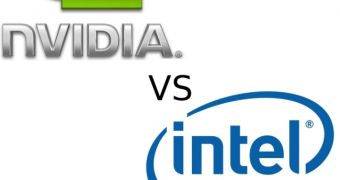As most of you already know, NVIDIA and Intel are currently feuding over a statement made by one of Intel's engineers, saying that users would soon have no need for GPUs. But there's an upside to this, as the battle between the two chip manufacturers can only benefit users, since both companies are planning to change the way visual computing will evolve. This materializes in NVIDIA raising the performance bar for its products, while Intel is trying to develop a new way in which applications can benefit from hardware products.
One of the people to have manifested a keen interest in this feud is Rob Enderle, Principal Analyst for Enderle Group. He took his time to make a couple of suggestions on the direction towards which, he thinks, the feud is heading. According to him, there are going to be three fronts: gaming, productivity and physics, where both NVIDIA and Intel will try to make themselves heard. He is also of the opinion that from these three, productivity and physics are the most interesting.
As far as productivity goes, we see a massive growth of services like YouTube and practices like video conferencing, the latter requiring a lot of real-time video compression. This comes down to real-time transcoding of high definition video into more compressed video types. NVIDIA has already told Enderle that its fastest card will be capable of transcoding a video in a little over 30 minutes which, by today's 2.5-hour standard, is impressive. Even if the 30-minute bar for transcoding isn't reached, an improvement of 50% is also something to brag about, the analyst pointed out.
When it comes to physics, we are seeing AMD/ATI licensing the physics technology from Havok, while NVIDIA has taken the technology it acquired from Ageia and put it in its graphics cards. But, although Intel's Havok has a strong position in terms of market penetration, Ageia's solution has been hailed as the best physics product, making the Ageia company a leading vendor in the physics market. However, game developers are ultimately the ones that decide who will be more successful, as they get to choose which of these technologies is better for their games.
Despite the fact that the feud only involves NVIDIA and Intel, a competitive response from AMD isn't that hard to fathom. It all depends on how well AMD's cards will be selling in the September buying cycle. If they achieve a strong position, they will be able to close the performance gap with NVIDIA, which ultimately means that users will have more competitive alternatives.

 14 DAY TRIAL //
14 DAY TRIAL //